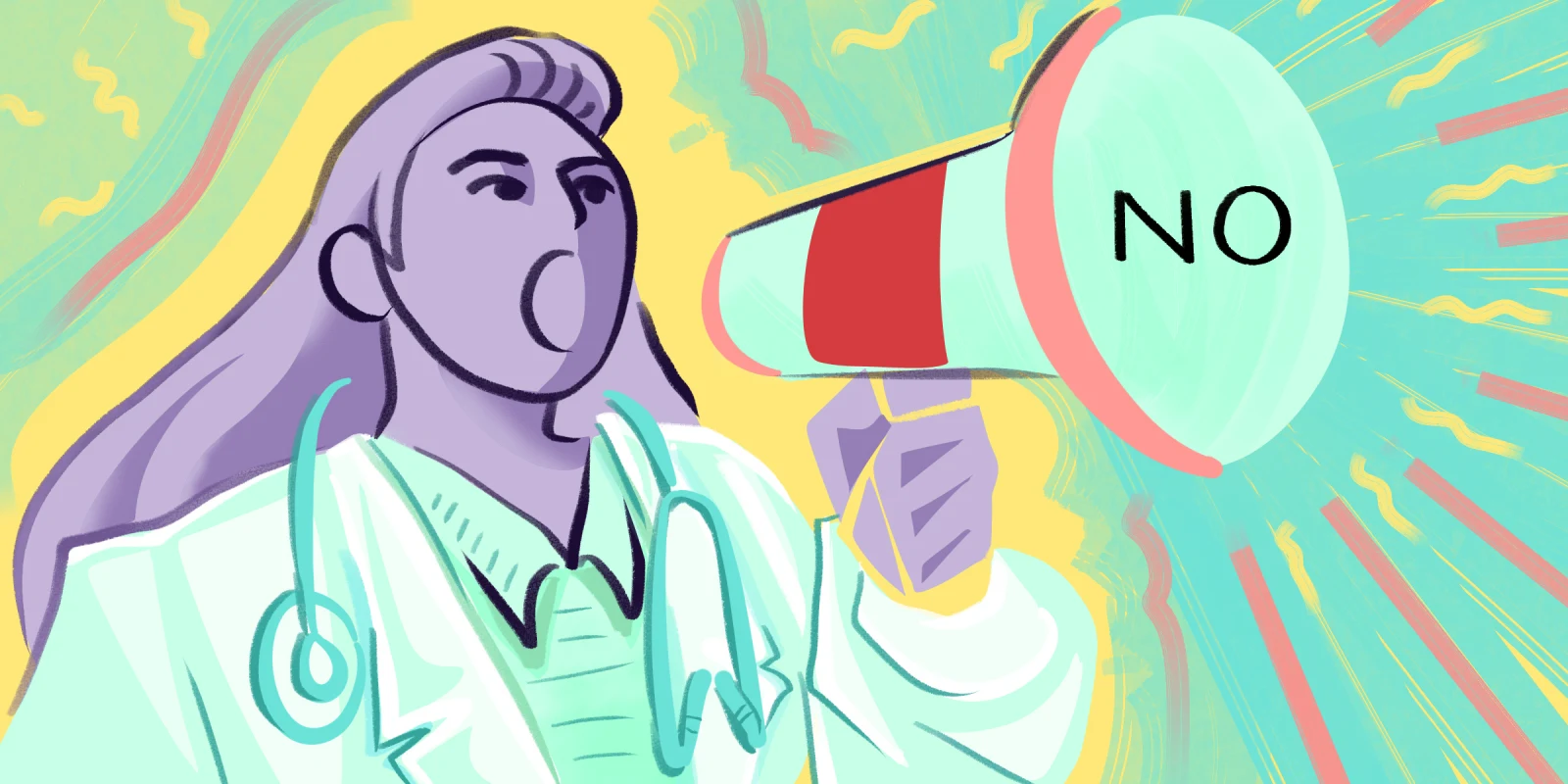I never considered myself a cat person. If you’d asked, I’d have told you I was a large dog person. Labs. Rotties. Dogs who are ready to hike, swim in a mountain lake, or go camping.
The cat came with my husband. Her name was Kitty Kitty. She was a tiny tabby with an attitude. At first, Kitty Kitty and I were wary of each other. When I entered the room, she’d pointedly leave. But one evening as I was writing, she jumped into my lap. She curled up, purring, and went to sleep. I was hooked.
It turns out you can take your cat camping. We bought an RV, and Kitty Kitty camped with us in New Mexico, Nevada, Oregon, Washington, Utah, and Arizona. I was doing a series of locums jobs as we toured the west. But I was also bringing something else with us to all these different places — the inability to say no at work.
In medicine, if you jump in to help, you’re rewarded. Would I return to the hospital at night? Yes. Could I cover a call shift? A consult? Yes, and yes. Co-workers loved me. There were tears when my locums gigs ended. It was heartwarming. I didn’t see anything wrong. What could be wrong?
Then, I took a W2 job because we needed health insurance. It’s easier to be someone who can’t say no when you’re a locums, because there are typically several weeks off between gigs. There is time to rest. Recover. But a W2 job doesn’t have that luxury. Vacation is parsed out. And yet, I was still saying yes.
Yes to seeing patients instead of onboarding, which meant learning a new EHR on the fly. Yes to taking the office near the construction site. Yes to the medical assistant no one else could work with. Yes to taking on my colleague’s patients when he left, and yes to doing it all without a raise. My administrators were happy; I wasn’t. I was exhausted!
Still, I continued to say yes as I quietly looked for another job. I thought the problem was my employer. I didn’t recognize my own contribution.
The new job offered low pay, but a great work-life balance. I accepted the initial offer. I didn’t negotiate. Again, I just said yes. For the first year it was the job of a lifetime. I had more autonomy than you’ll find in most W2 jobs for physicians. I enjoyed my colleagues. I enjoyed my patients. But it didn’t last.
Our clinic hired a new manager. Suddenly, vacation requests were denied. CME reimbursements were denied. Then, CME was denied. When we thought it couldn’t get worse, it did. Requests for an hour off were denied. If you needed an hour off for an appointment, you had to take an entire vacation day.
We were micromanaged. Scrutinized. Chastised. We were told what to say and how to say it. People who spoke up found themselves in an HR meeting with insubordination letters in their personnel file. People began to quit and even retire early. As things deteriorated further, the medical staff got together and composed a joint letter to the new manager’s supervisor. But nothing changed.
Now, Sunday evenings were filled with dread. What would happen next? My colleagues were similarly preoccupied. We were medical professionals, trained to use logic. This treatment of professionals made no sense. It occupied our minds at home. It occupied our minds when seeing patients. We communicated after hours about it. We no longer discussed how to help our patients; we discussed our supervisor. It was all we talked about.
After nearly a year of this, the stress had migrated into our home life. I wasn’t truly present at home. My husband complained I didn’t notice him. Kitty Kitty began meowing loudly at me for attention. I felt stuck because our medical insurance was through me. What would we do without it?
I was numb. Even my writing stalled. I’d been offered publication of my poetry book by a fabulous publisher, but I wasn’t working on it. I was barely showing up for my own life.
Kitty Kitty, by this time, was an old girl. She was losing weight. We needed a vet closer to home. We tried several clinics before settling on a laid-back office that worked for us. I knew they were it when they laughed and said our cat’s name, Kitty Kitty Fox, sounded like a Vegas dancer.
Kitty Kitty was prescribed a low protein diet to protect her failing kidneys. She was not pleased. She refused to eat it, and her weight loss accelerated. She began escaping the house to eat the cheap cat food our neighbor placed outside for strays. Her condition motivated me to say no for the first time in a medical setting. I told the vet I wasn’t going to starve our cat with food she wouldn’t eat. I was nervous. I expected a lecture, but our vet was understanding.
Then, the call came. It was my husband. I needed to meet him at the vet. It was 4 p.m., and Kitty Kitty was dying. I’d finished my work for the day, so I asked to go. I’d like to tell you that I stood up to my supervisor when I was told I couldn’t leave. I’d like to tell you that I said no. I’d like to tell you that I made it to the vet in time to say goodbye to Kitty Kitty. But I didn’t. Over the months that followed, I grieved. I was angry. I didn’t get to say good-bye. But as the grief began to settle, something else started creeping in. What was my part in this?
As my husband reflected, “No one chained your ankle to the desk.” I could’ve ignored the threats and left. But I didn’t. I made a choice from fear. Fear of having a negative report in my personnel file. Fear of saying no. It was fear that stopped me from being there for Kitty Kitty’s last moments.
As I reflected on Kitty Kitty and her final hours, I realized my failure to say no throughout my career has been motivated by fear. Fear of disappointing colleagues. Fear of coworkers thinking I’m not pulling my weight. And most recently, fear of retaliation.
Kitty Kitty deserved better. So did I. As I thought about it further, I realized that saying no doesn’t define us, it protects us. It protects our families. Our patients. It gives us the head space and heart space to be there fully. For our patients. Our families. For ourselves.
Saying no makes room for the things in life that bring deeper meaning. It protects the quiet things that are all too easily set aside. Saying no opens up new avenues for saying yes to what brings us joy and fulfillment. In this age of burnout, it’s important to say no when needed. By doing this, we also say yes to our patients, to our families, and even our pets.
What have you recently said "no" to? Share in the comments.
Shari Crane Fox is a double board-certified psychiatrist and Best of the Net Poetry Nominee who holds advanced degrees from Mayo Clinic, Stanford, UA, and UCSD. She enjoys kayaking, baking, and a good pour-over.
Illustration by April Brust






